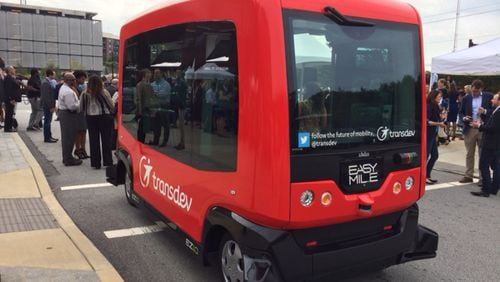Atlanta unveiled a stretch of “smart” road Thursday that could help usher in an era of driverless cars and transform the city’s transportation infrastructure.
The North Avenue Smart Corridor Project – which stretches from the Coca-Cola headquarters and Georgia Tech to the Ponce City Market – includes adaptive traffic signals, high-definition cameras and other technology that advocates say will improve safety and speed traffic on a busy east-west street.
Don't expect to see fully autonomous vehicles driving down North Avenue any time soon – there are still technological and legal hurdles to overcome. But if all goes well, North Avenue will become a model street for Atlanta and the nation.
“Atlanta will become a national leader in the smart-cities movement,” Mayor Kasim Reed said at a ceremony at Ponce City Market Thursday.
The $3 million project brought several new technologies to the 2.3-mile stretch of North Avenue. Among them:
• Adaptive traffic signals, which monitor traffic flow and can make real-time adjustments. By allowing the lights to adjust their timing as needed, the new technology could cut commute times along a corridor that carries nearly 29,000 vehicles a day in some spots.
• Video surveillance cameras, which monitor pedestrians and bicycles as well as vehicles. Among other things, the cameras could detect pedestrians crossing the road, allowing a traffic signal to wait just a little longer to turn green so they can finish crossing.
• “Connected vehicle systems” technology that could allow traffic signals to communicate with autonomous vehicles or with drivers’ smart phones. Such technology might tell you to slow down as you approach an intersection so you can catch a green light, for example. Or it might alert you if you’re speeding through a school zone.
• A system that allows emergency vehicles to preempt traffic signals and speed through intersections.
These and other technologies could save lives and substantially reduce traffic congestion, according to Georgia Department of Transportation Commissioner Russell McMurry.
He said the North Avenue project is just one example of how the Peach State is embracing new traffic technologies. Georgia already has more than 300 adaptive traffic signals – most of them in Cobb County and Sandy Springs – the most of any state.
“We want to be the early adopters,” McMurry said.
Atlanta already is using such technology to manage traffic at big events. Typically, it can take 90 minutes to empty a parking garage after an event at Philips Arena. But such technology allowed the city to cut that time in half after a recent event, according to Faye DiMassimo, general manager of the city’s Renew Atlanta infrastructure bond program.
Georgia Tech plans to analyze data from sensors along North Avenue to help Atlanta set benchmarks for congestion relief and other areas. The information will be used to help create similar corridors elsewhere.
Campbellton Road in southwest Atlanta and Buckhead Loop are among the streets that could see such technology in the near future.
MYAJC.COM: REAL JOURNALISM. REAL LOCAL IMPACT.
The AJC's David Wickert keeps you updated on the latest in what's happening with transportation in metro Atlanta and Georgia. You'll find more on myAJC.com, including these stories:
Never miss a minute of what's happening in Atlanta transportation news. Subscribe to myAJC.com.
In other Transportation news:
About the Author








